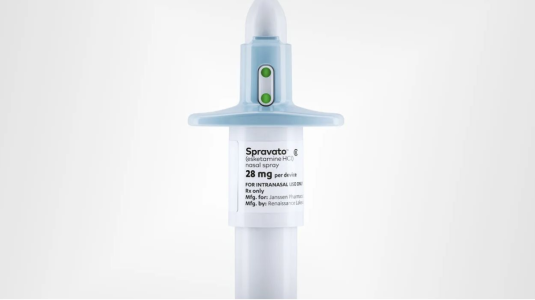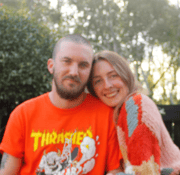Nasal spray breakthrough offers new hope for severe depression
By
Gian T
- Replies 1
Mental health challenges continue to affect countless Australians, and for some, finding relief has been a long and difficult journey.
Yet, new developments are offering a renewed sense of possibility.
A treatment closely related to an existing therapy is on track to become easier to access and more affordable, bringing fresh hope to those who have spent years navigating the complexities of persistent mental health struggles.
The drug in question is a nasal spray called Spravato, known scientifically as esketamine.
It's a relative of ketamine, which has been used for years as a potent anaesthetic and, more infamously, as a recreational drug in the party scene.
However, esketamine's purpose is far more therapeutic, offering a new avenue for those who have found little relief from existing antidepressants.
Since the late 1980s, when Prozac and its ilk first hit the market, there have been no significant breakthroughs in pharmaceutical treatments for depression.
These traditional drugs primarily target serotonin, a neurotransmitter associated with feelings of well-being and happiness.
However, they often require weeks or even months to take effect, leaving many patients in limbo as they await relief.
Spravato operates on a different principle. It zeroes in on glutamate, another neurotransmitter, but one that's thought to play a crucial role in restoring synaptic connections in the brain, which can help alleviate depression.
The effects of Spravato can be felt within hours, offering a rapid response that has been elusive with other treatments.
Professor Ian Hickie of the University of Sydney, a co-director of Health and Policy at the university's Brain and Mind Centre, has firsthand seen the drug's impact.
'Most of the drug development we’ve had in the last three decades has mimicked what had preceded it,' he said.
'This is different...it targets a different neurochemical system–glutamate–and appears to regulate those brain circuits that regulate mood in a different way.'
He's been involved in administering esketamine to a select group of patients under a special access scheme and has witnessed its swift action in combating depressive symptoms.
The good news for Australians is that starting Thursday, Spravato will be included in the Pharmaceutical Benefits Scheme (PBS), making it an affordable option for up to 30,000 people.
This marks the first new type of medicine for major depression to receive government funding in three decades, a milestone in mental health treatment.
Australian trials of the ketamine-like drug have shown that about 50 per cent of participants who had not responded to conventional treatments experienced significant improvement.
'Not all depression is the same, nor does it have the same chemical explanation in all people,' Hickie added.
'For some people, particularly those who have failed to respond to the conventional serotonin-focused agents or monoamine-focused agents, this is different, and they appear to benefit.'
This suggests that Spravato could fill a critical gap for those whose depression does not align with the serotonin-focused approach of most current antidepressants.
Depression is complex and varies significantly from person to person. For some, the issue may not lie with serotonin but with other chemical processes in the brain.
Esketamine offers an alternative for those individuals, targeting the glutamate system and regulating mood in a way that's distinct from other medications.
Since its approval by the Food and Drug Administration in 2019, esketamine has been used in emergency rooms and urgent care settings across the United States, offering rapid relief from the crushing weight of severe depression and suicidal thoughts.
For Australians, Spravato will now be available through the PBS for $31.60 per dose or $7.70 for pensioners and concession card holders.
However, it's important to note that there will be additional healthcare and administration costs, as the treatment requires supervision by a healthcare professional at a certified treatment centre.
The Minister for Health and Aged Care, Mark Butler, has expressed that the PBS listing will make this novel drug more affordable and significantly improve the quality of life for thousands of Australians.
Joana De Castro, the managing director of Johnson & Johnson’s innovative medicine ANZ, echoed this sentiment, calling the listing 'long overdue' after a four-year wait since the drug's registration by the Therapeutic Goods Administration.
For our readers who may be struggling with treatment-resistant depression or know someone who is, this development could be a turning point.
It's a reminder that the journey towards better mental health is ongoing, and with each new advancement, there's renewed hope for a brighter, more manageable future.
 Have you or someone you know faced challenges with depression treatment? What impact do you think this new medication could have on the lives of those affected? Share your thoughts and opinions in the comments below.
Have you or someone you know faced challenges with depression treatment? What impact do you think this new medication could have on the lives of those affected? Share your thoughts and opinions in the comments below.
Yet, new developments are offering a renewed sense of possibility.
A treatment closely related to an existing therapy is on track to become easier to access and more affordable, bringing fresh hope to those who have spent years navigating the complexities of persistent mental health struggles.
The drug in question is a nasal spray called Spravato, known scientifically as esketamine.
It's a relative of ketamine, which has been used for years as a potent anaesthetic and, more infamously, as a recreational drug in the party scene.
However, esketamine's purpose is far more therapeutic, offering a new avenue for those who have found little relief from existing antidepressants.
Since the late 1980s, when Prozac and its ilk first hit the market, there have been no significant breakthroughs in pharmaceutical treatments for depression.
These traditional drugs primarily target serotonin, a neurotransmitter associated with feelings of well-being and happiness.
However, they often require weeks or even months to take effect, leaving many patients in limbo as they await relief.
Spravato operates on a different principle. It zeroes in on glutamate, another neurotransmitter, but one that's thought to play a crucial role in restoring synaptic connections in the brain, which can help alleviate depression.
The effects of Spravato can be felt within hours, offering a rapid response that has been elusive with other treatments.
Professor Ian Hickie of the University of Sydney, a co-director of Health and Policy at the university's Brain and Mind Centre, has firsthand seen the drug's impact.
'Most of the drug development we’ve had in the last three decades has mimicked what had preceded it,' he said.
'This is different...it targets a different neurochemical system–glutamate–and appears to regulate those brain circuits that regulate mood in a different way.'
He's been involved in administering esketamine to a select group of patients under a special access scheme and has witnessed its swift action in combating depressive symptoms.
This marks the first new type of medicine for major depression to receive government funding in three decades, a milestone in mental health treatment.
Australian trials of the ketamine-like drug have shown that about 50 per cent of participants who had not responded to conventional treatments experienced significant improvement.
'Not all depression is the same, nor does it have the same chemical explanation in all people,' Hickie added.
'For some people, particularly those who have failed to respond to the conventional serotonin-focused agents or monoamine-focused agents, this is different, and they appear to benefit.'
This suggests that Spravato could fill a critical gap for those whose depression does not align with the serotonin-focused approach of most current antidepressants.
Esketamine offers an alternative for those individuals, targeting the glutamate system and regulating mood in a way that's distinct from other medications.
Since its approval by the Food and Drug Administration in 2019, esketamine has been used in emergency rooms and urgent care settings across the United States, offering rapid relief from the crushing weight of severe depression and suicidal thoughts.
For Australians, Spravato will now be available through the PBS for $31.60 per dose or $7.70 for pensioners and concession card holders.
However, it's important to note that there will be additional healthcare and administration costs, as the treatment requires supervision by a healthcare professional at a certified treatment centre.
The Minister for Health and Aged Care, Mark Butler, has expressed that the PBS listing will make this novel drug more affordable and significantly improve the quality of life for thousands of Australians.
For our readers who may be struggling with treatment-resistant depression or know someone who is, this development could be a turning point.
It's a reminder that the journey towards better mental health is ongoing, and with each new advancement, there's renewed hope for a brighter, more manageable future.
Key Takeaways
- Spravato, a nasal spray similar to ketamine, will be subsidised on PBS to help Australians with treatment-resistant depression.
- This represents the first significant innovation in antidepressant medications since the late 1980s, targeting the neurotransmitter glutamate rather than serotonin.
- Clinical trials in Australia have shown that about 50 per cent of participants with treatment-resistant depression improved with Spravato.
- The drug will be subsidised, with additional healthcare and administration fees in certified treatment centres.








